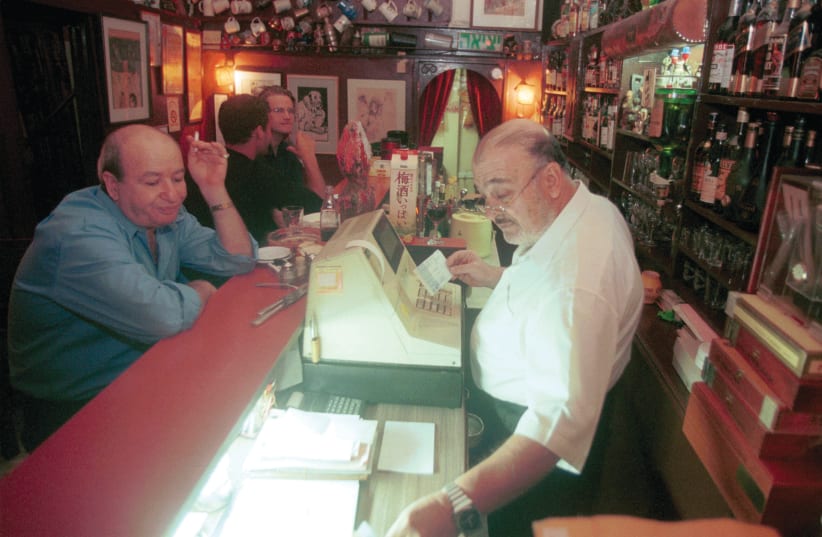In these days of celebrity restaurants, I remember the times when things were a lot more relaxed and, well, a lot more down to earth.
So it is with much nostalgia that I remember my visits in the early 1980s to a tiny Jerusalem bar with six tables, at the corner of King George Avenue and Histadrut Street.
Fink’s was its name, and it was presided over by the late David Rothschild and his son-in-law, Mouli Azrieli, who passed away last month. Together, these two fellows were the perfect hosts, warmly greeting guests from their familiar perch behind the bar.
Truth be told, there was nothing fancy about Fink’s, which was open for dinner and drinks from the early evening every day except Friday. From the outside there was an unexceptionable facade, which did not suggest the home of such a legendary bar. A simple sign, “Fink,” identified it in Hebrew and English.
Inside, you were surrounded by bric-a-brac oddities: coffee cups of every sort, drawings, watercolor sketches, humorous sayings on the wall, and a large chandelier of unknown vintage suspended from the ceiling.
But what Fink’s didn’t exhibit in terms of elegance, it made up for well beyond measure by its two wonderful hosts, as well as its infectious charm, great food, and, of course, a storied history. Quite simply, Fink’s was a one-in-a-million kind of place – a fabled piece of Jerusalem life.
Your dinner experience might also include Fink’s trademark dish – goulash soup, which was served in a big coffee mug with generous helpings of warm bread – a dish Rothschild rightly characterized as “more a propaganda piece. It helped make us famous.”
With the passage of time, I no longer remember how I first discovered Fink’s, but from the moment I first stepped into the establishment and met Rothschild and Azrieli, I knew that I had found my home away from home.
Fink’s was first opened in 1932 by Moshe Fink, who sold it to Rothschild in 1945, several years before Israeli independence. This was a time when British military officers would show up at the bar for drinks – and the Jewish underground would somehow manage to be there too, keeping an ear open for what the Brits might be planning.
Sadly, Fink’s closed its doors in 2005 after a long and colorful 73-year run. Over the decades, it hosted journalists, politicians, writers and celebrities of every kind. You really never knew who you might encounter, something illustrated by the following anecdote.
BEFORE ISRAEL signed its peace treaty with neighboring Jordan, the ambassador of then-West Germany risked creating an international incident by crossing the border to have dinner at Finks.
“Nobody said anything about it at the time,” Azrieli told me. “The ambassador left his residence in Amman, crossed the border, and sat at a table. After he had dinner, he went back.”
But perhaps the most famous diplomatic story involved Henry Kissinger during the disengagement negotiations between Israel and Egypt in 1973.
In-between shooting dice with a few regulars, Rothschild recalled that an American news correspondent, one of many who had descended on Israel to cover the Israeli-Egyptian negotiations, suggested that Kissinger be invited for drinks or maybe even dinner. It would be a good opportunity, so the thinking went, to get some inside scoop on the negotiations.
Soon thereafter, things got interesting when Kissinger’s security office called Rothschild on the phone to tell him that Kissinger, the consummate negotiator, did indeed want to visit with a party of people.
So far so good, except that there was one catch: Everyone else would have to be kept out.
“Well,” Rothschild recalled to me in his German-accented English, throwing out his chest and pausing briefly: “I told him, ‘Security is your bloody business, not mine. I don’t keep anyone out.’”
And that was that for about two weeks.
Then there was another call, this time from Kissinger’s press chief, who requested a table without conditions, except that the request was for Friday night, when the bar was closed. So, unfortunately, the visit never took place.
With Golda Meir, the late prime minister of Israel, things weren’t so complicated.
“I remember her sitting at the bar, waiting for a table,” Rothschild told me. She would be chain-smoking cigarettes, enjoying the conversation.
“Once, I made a mistake with her,” he confided. “I asked some people who were ahead of her to wait because Golda didn’t have a table yet.
“Well, Golda got angry with me because I tried to put her ahead of the other guests. I told her, ‘Golda, I would do anything for you.’” But Golda stood her ground and waited for her turn.
Rothschild fled Hitler’s Germany in the 1930s, going first to Holland, then to France, and finally to what was then Palestine.
“I came here with nothing minus,” he said. “I didn’t even have the money to pay the fare from Jaffa Port to Jerusalem, so I had to give my suitcase as a deposit.”
It was a totally fortuitous voyage, of course, because it led to a wonderful Jerusalem tradition, of which only memories now remain.
In an anonymous scrapbook entry, a visitor wrote these memorable words, poignantly capturing the essence of Fink’s: “I am moved by being here,” he noted, “as if to a shrine.”
